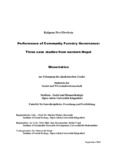Please use this identifier to cite or link to this item:
http://archive.nnl.gov.np:8080/handle/123456789/177| Title: | Performance of Community Forestry Governance: Three case studies from western Nepal |
| Authors: | Devkota, Kalpana Devi |
| Keywords: | Community Forestry |
| Issue Date: | 25-Mar-2019 |
| Abstract: | Community Forestry in Nepal is based on the realm of a decentralized participatory forest management approach. While this approach has a well documented history in addressing socio-economic, governance and environmental issues, the range of challenges still persist in livelihood and equity, governance and socio-ecological aspects. These issues are not only important for community forest user groups, but are equally related to multi-stakeholders, ranging from micro to macro-levels that need to be addressed for the advancement of community forestry in the future. This research, therefore, attempts to assist this process, by concentrating study in forest governance issues from micro to macro-levels, including various stakeholders. The overall aim of this study has been to explore and analyze the effectiveness of community forestry governance in Nepal. Three specific objectives were formulated in order to address the aforementioned issues, which are to: a) analyze the performance of community forestry using a set of governance criteria related to institutional and ecological aspects; b) explore and analyze the contribution of community forestry towards livelihood of forest users; and c) to analyze the governance of higher level-stakeholders (service providers) for the advancement of community forestry. This research explores and analyses community forestry governance on two levels: a) at the level of community forest user groups, who are the primary users and managers of community forests; and b) the examination of higher-level stakeholders, including policy makers and service providers for community forestry programmes at national-level. At user group level, research was based on case study approach and the data were collected from three different community forest user groups in the western-region of Nepal: Gijara, Shreejana and Bavanpurwa. Household survey interviews, focus group discussions, in-depth interviews, participatory observation and workshops were the most commonly applied methods of data collection at the user group level. At the higher stakeholders’ level, interviews were carried out with forestry experts working in governmental and nongovernmental organizations and with donors working for, and supporting, community forestry programmes. |
| URI: | http://103.69.125.248:8080/xmlui/handle/123456789/177 |
| Appears in Collections: | 300 Social sciences |
Files in This Item:
| File | Description | Size | Format | |
|---|---|---|---|---|
| Kalpana devkota-PhD Thesis.pdf | 2.18 MB | Adobe PDF |  View/Open |
Items in DSpace are protected by copyright, with all rights reserved, unless otherwise indicated.